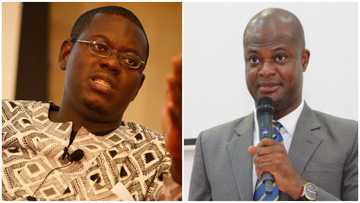5.6% GDP Growth In Covid Times Much Better Than 3.4% Under Mahama – Akufo-Addo
- President Nana Akufo-Addo says the performance of Ghana's economy under his watch was much than under John Mahama
- The President said despite the challenges of Covid-19, GDP growth under his administration was 5.6% compared to 3.4% under Mr Mahama
- The President's comments comes in the wake of criticisms of his management of the economy, particular unsustainable spending and ballooning debt figures
PAY ATTENTION: Click “See First” under the “Following” tab to see YEN.com.gh News on your News Feed!
President Nana Akufo-Addo has been lauding the performance of the economy under his watch, stating that economic growth – even in the era of the Covid-19 pandemic – was much better than growth under his predecessor, John Mahama.
Delivering a keynote address at the National Labour Conference held in Kwahu Nkwatia, in the Eastern Region, on Monday, February 28, 2022 the President said current GDP figures trumps those of the previous administration.
“It is encouraging for my government and party, the New Patriotic Party, to recall that the rate of growth of the economy, 5.6%, against the background of the exceptionally difficult circumstances of the COVID-era, is still considerably better than the 3.4% we inherited (in 2016) in calmer times from our predecessor administration,” a report published on official page of the Presidency quoted the Akufo-Addo.

Source: Facebook
According to Akufo-Addo, Ghanaians “should not forget that, prior to the outbreak of the pandemic, we witnessed average annual GDP growth rates of seven percent (7%) in 2017, 2018, 2019 and part of 2020, when our economy was then, generally, acknowledged as one of the fastest growing in the world.”
Download YEN's news app on Google Play now and stay up-to-date with all major Ghana news
The President's self-commendation comes in the wake of wide-spread criticisms about how he was running Ghana’s economy.
Many economists have mentioned the current huge and unsustainable government spending and ballooning debt figures.
Speaking at the event on Monday, the President also said the proactive decisions taken by his government to fight the pandemic, as well as revitalising and transforming the economy are yielding results.
He mentioned the GHS100 billion COVID-19 Alleviation and Revitalization of Enterprises Support (Ghana CARES) ‘Obaatampa’ Programme for job creation over a three-year period as one of those proactive decisions.
The first phase of the Ghana CARES programme, the phase of stabilisation, came to end in 2020.
The second phase, which started in 2021, aims at revitalising and transforming the economy between 2021 and 2023, and is focused on supporting commercial farming and attracting educated youth into agriculture, building Ghana's light manufacturing sector, developing the engineering/machine tools and ICT/digital economy, developing Ghana's housing and construction industry, reviewing and optimising the implementation of Government flagships and key Programmes, creating jobs for young people, and expanding opportunities for the vulnerable in society, including physically challenged persons.
“As a result of this programme and the policies being implemented by Government, the economy grew at a provisional 5.2% in the first three quarters of 2021. This growth is expected to be sustained in the medium term,” the President said.
President Akufo-Addo continued: “The overall real GDP for the medium term is projected to grow at an average rate of 5.6%, and we remain committed to returning to the fiscal deficit target threshold, as enshrined in the Fiscal Responsibility Act, Act 982, from this year.”
Government, he reassured, will continue to demonstrate the ability, resolve and determination to change the trajectory of our economy in order to help us recover faster from the effects of COVID-19.
Ghana Cedi Plunges Against Dollar To Become Africa's Worst-Performing Currency
The latest report by Ghana-based finance analyst, Databank, shows Ghana sits at the bottom of a 15-currency ranking after depreciating by 7.6% to the U.S. dollar.
This makes the local currency the worst-performing on the continent.
At the start of 2022, the Ghana cedi sat at number 14, beating only the Zambian kwacha.
Our manifesto: This is what YEN.com.gh believes in
Source: YEN.com.gh




